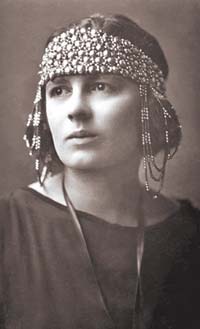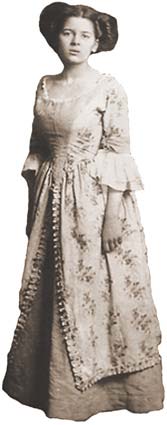Invisible Freedom FAR FROM OBLIVION AND SILENCE: REBECCA WEST, THE FAMOUS WRITER WHO LOVED US
A Love Affair With the Serbs
The “New Yorker” called her masterpiece “Black Lamb and Grey Falcon” a great book of spiritual revolt against the 20th century”. The “New York Times” compared her love for Serbia with Hemingway’s inspiration for Spain. And she wrote in the epilogue of her famous book, in London, in the springtime of 1941, watching bombs falling on her burning town: “While I was thinking about invasion, or when a bomb would fall somewhere nearby, I prayed very often: ‘God, please let me behave as a Serb!”
By: Dragana Bukumirović
 If she did not take her pseudonym from Ibsen’s heroine maybe she would not acquire world fame with her real name: Cicely Isabel Fairfield. Maybe she would become a famous actress, which she was for some time, but had no success. One must admit: Cicely sounds unconvincing for a great lady writer. Mrs. West, Rebecca West — that is something completely different! If she did not take her pseudonym from Ibsen’s heroine maybe she would not acquire world fame with her real name: Cicely Isabel Fairfield. Maybe she would become a famous actress, which she was for some time, but had no success. One must admit: Cicely sounds unconvincing for a great lady writer. Mrs. West, Rebecca West — that is something completely different!
Who is the woman whose work survives for more than 60 years and attracting attention just like the first day?
Rebecca West (1892-1983) was born as the youngest of three daughters in a mixed marriage of her Scottish mother Isabelle Mackenzie and English father of Irish origin, Charles Fairfield, a gifted journalist and orator. The daughter inherited her father’s gift.
EARLY WORKS  The literary adventure of Rebecca West began in the time of her legal age. In the age of 19 she was a convinced socialist and a member of the suffragette movement, a politically determinate journalist and a fighter for female rights. She publishes her early works in magazines Freewoman and Clarion. The literary adventure of Rebecca West began in the time of her legal age. In the age of 19 she was a convinced socialist and a member of the suffragette movement, a politically determinate journalist and a fighter for female rights. She publishes her early works in magazines Freewoman and Clarion.
But she often wrote about important people, not the ones in the shadow, the anonymous ones, with such passion. She aroused many people with anger, and she mostly harmed herself. One of the victims of her articles was H. G. Wells, preaching ideas of free love.
This is how she wrote about him: “He is an old girl among novelists: sexual obsession which lies in his work, just like cold béchamel sauce, is only an old maid’s mania, a reaction to the sensuality of the mind.”
Mr. Wells invited the insolent creature to lunch, and everything ended nine months later, with a labor. His stories about free love, for which she attacked him, she felt for herself. She was pregnant only a few minutes after England declared war to Germany. Wells gave his surname to their son Anthony, but he never married his mother. This was his revenge.
This event sharpened her pencil even more and stuffed even greater defiance towards the world. Especially towards the shameful war. In a series of articles about war she glorifies young women who work in munitions’ factories.
She published her first book The Return of the Soldier at the age of 26. She never stopped writing since. Then followed the books: The Judge, The Thinking Reed, The Fountain Overflows, The Birds Fall Down... She also writes essays, and her famous biography of St. Augustine was published in 1933.
World War II strengthened new humanistic opinions and ideas. After the war in The New Yorker she wrote a series of texts on the Nuremberg trials. The ended between cover of a book called The Meaning of Treason.
PROSE WITHOUT A SMILE The crown of her literary adventure was a large travel book about Yugoslavia, Black Lamb and Grey Falcon. The book was commented in The New Yorker as a “great book of spiritual revolt against the 20th century”. The New York Times went further: it was marked as a love affair with Yugoslavia, especially with the Serbs. West probably wrote in a masculine manner when she deserved these comparisons: the work has some of Hemingway’s sense and inspiration for Spain.
Her book Black Lamb and Grey Falcon reached our readers almost a half of century later. The original edition form the 80’s was crippled, sad and shortened, many chapters were missing of that first class “prose without a smile”. Rebecca did not get inspired by communism, and her book was interpreted by some people as a “brutal attack on brotherhood and unity” and on many national and idealistic myths, which was against the wishes of the regime. That is why a lot of time passed until the complete version was published. This exciting work of travel literature, and an essay as well, reached our readers only two years ago as a complete work and not full of censorship and shortened parts. The book was published by “Mono & Mañana” and translated into Serbian by Ana Selić.
Finally, we should remember that the great Miloš Crnjanski, excited by Rebecca West’s book, in vain tried to find a publisher in London. They found many reasons to postpone the publication which was finished not until 1941.
This intriguing saga represents a personal act of a capable author skilled in writing and observing. This creative and special report from a six week long journey through Yugoslavia became a two volume description of the country which has disappeared a long time ago. Even more, Black Lamb and Grey Falcon is a dynasty saga about Hapsburgh and Karađorević families, a scientific work on Byzantine archaeology, pagan folklore and Christian and Islamic philosophy. Besides that, the book offers us a magnificent psychological analysis of the German mind and the origins of Fascism and terrorism in the 20th century. Many have marked the work as a warning about the danger which reached Europe by totalitarianism in 1940 and in the years to come.
EASING THE PAIN  The careful reader will understand how much Rebecca West loved us, maybe even more than we loved ourselves. She was obsessed with us. Serbia was her paradise lost. In the maelstrom of today’s ferments and prejudices about Serbs and Serbia, this book comes as a consolation and a shelter. The careful reader will understand how much Rebecca West loved us, maybe even more than we loved ourselves. She was obsessed with us. Serbia was her paradise lost. In the maelstrom of today’s ferments and prejudices about Serbs and Serbia, this book comes as a consolation and a shelter.
Rebecca West admired the intensive life in Serbian regions, strong drinks, spicy food, and parties deep into the night, beautiful men and peasant costumes. She said that Slavs have “a never-ending ability to investigate and examine”.
She loved us so much that she found Slav origins in her family tree.
The writer of this great book lightened our country with her great intelligence, keen mind, gifted writing and severe language. She came here in 1936 for the first time and her guide was Stanislav Vinaver: a writer and an erudite of restless spirit. She wrote it all down in Black Lamb and Grey Falcon. This sentence witnesses her great writing: “I hate bad imitation, their stink is worse than any other.”
In her prologue, she mocks English people “of humanitarian and reformist tendencies” who went to the Balkans and came back “understanding Serbian people as the suffering one and the innocent one, tortured since forever and never a tormentor”. The author’s intention is clear. She is dealing with Western prejudices towards the Balkans. “Through the example of South Slavs she wanted to shows what she was ashamed, disgusted and terrified with in Europe of that time...”
Many heard of the book but only few read it. This book celebrated “the lady author who loves the Serbian people” forever.
When she finished the last lines of her masterpiece, longer than The Old Testament, Hitler already conquered Europe. At the end of the war, Rebecca West’s book was a true ease for the pain. After the Turks and the Germans, a totally new occupation was beginning.
A SHINING ARC ABOVE LIFE Rebecca West’s essay on Gračanica is healing as well, saying the following: “This church was not built by chance. She was not built with simplicity but with a rather intellectual refined taste... This is a church which could be built by the architects from the Hampton court if they were not so obsessed with gothic art in that part of Europe. For me, it was an exciting accordance given that King Milutin, who built Gračanica about 70 years before the Battle of Kosovo, looked a lot like our Henry VIII...”
This long-lived woman had a rich and tempestuous life. She came a long way from Cicely Isabel Fairfield, the unsuccessful actress and the unmarried mother of an only son, in order to live to a ripe old age, she died at the age of 91 as Dame Commander of the Order of the British Empire.
She aroused many people with anger, and she mostly harmed herself.
She said about Joyce: “He writes so loud but so senseless like he is washing a carpet.” She said for men: “They have no sense of existence except when it comes to moving pianos”. In that cynical style, she said that maternity has a characteristic of the “Trojan Horse”.
The shining arc above her life was immortalized on a photograph, only some time before she died. It is an image of the Empress Lady on a throne; one arm lies on the carved back of an arm chair and the other in her lap. White hair, precious rings… Rebecca West finally has it all: the money, the self-confidence, the reputation.
All that she really earned with her mind, her gift and inexhaustible energy.
|
|
|
|
